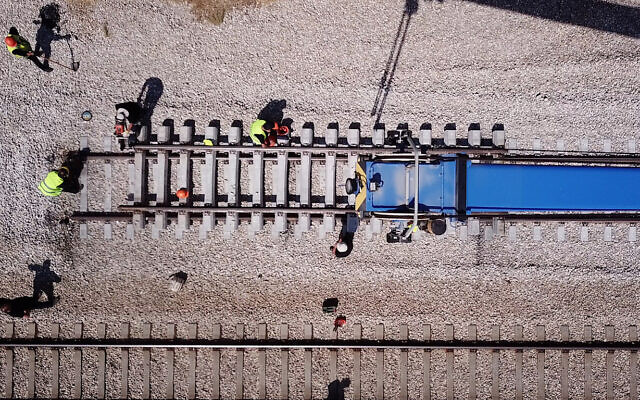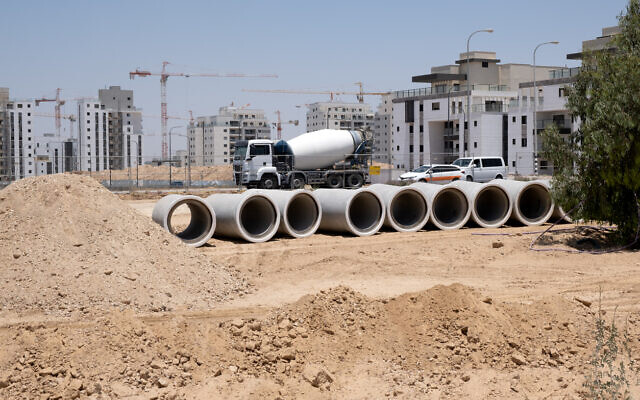Forecast of short supply of building materials until 2040 further imperils housing
Energy Ministry warns domestic supply will fail to meet high demand for construction materials to build homes, roads, infrastructure, per current growth rates
Construction materials to build housing, roads, and transportation infrastructure are likely to be in short supply until at least 2040, Israel’s Energy Ministry warned recently in a comprehensive report that gauged demand in Israel for raw materials in the construction and paving industry for the coming decades.
In an announcement last week, the ministry released a 121-page report (in Hebrew) that said the projected demand for raw materials such as stone, sand, gravel, limestone, and other basic organic materials needed by the construction and paving industries was forecast at about 2.08 billion (metric) tons for the next 17 years, based on current population growth rates, an increase of about 360 million tons on the amount forecast in 2022 when the ministry updated a national strategic plan from 2017 for mining and quarrying.
The 2022 report showed the ministry, which oversees mining and quarrying across the country, calculated demand at about 1.69 billion (metric) tons, 170 million tons more than the forecast five years later.
The 2017 plan was based on demand numbers calculated in 2009 and was intended not just to meet demand but to provide reserves. The 2022 report makes clear that scheduled delivery will fall short, leaving a substantial unmet need for these materials and jeopardizing building plans.
The most recent update, prepared by Israeli economic consulting firm Heifetz and Company and released on February 27, prompted the ministry to propose a series of steps meant to offset the expected shortage. These include moving ahead with an existing plan from 2017 that marked designated sites for mining and quarrying and establishing unloading sites for materials through rail transportation in high-demand areas in central Israel. These plans, according to the ministry, are being held up by opponents with “NIMBY” objections, a reference to the acronym that stands for “not in my backyard.” The colloquialism, used often in the housing and construction world, refers to the opposition to new development and projects in neighborhoods and areas, often by existing residents and local authorities.
The Energy Ministry argued that work at these sites under the strategic plan, called TAMA 14 B, “could help increase the reserves available in the various quarries.” Similar planning should be undertaken in the West Bank on both private and state land, the ministry said in the announcement, in joint work with the Defense Ministry’s Civil Administration, responsible for civilian affairs including construction in the IDF-controlled Area C.

An additional course of action would require contractors to better manage construction waste and separate by-products on-site to recycle materials that could serve as potential alternatives to natural quarry materials, the ministry said. But this measure would add time and costs to contractors’ work, and these expenses are often passed down to clients.
It should also be possible to increase imports of core building materials, over the land borders with both Egypt and Jordan without materially impacting the cost of building. Importing these heavy materials by sea is far more expensive, and an option of last resort, according to the Energy Ministry.
“The continued development of the State of Israel requires functional continuity of the supply of quarrying materials to the construction and paving industry,” the ministry said. “The reserves of raw materials [for the construction and paving industry] are depleting and therefore many quarries are closing.”
If the proposed steps are not taken, “the State of Israel must prepare for a situation of a severe shortage of quarrying materials” it warned.
The substantial increases in housing prices in Israel over the last couple of years can partly be attributed to increases in the costs of raw materials due to shorter supply. These costs reached an all-time high in December 2022, based on the Construction Index, a financial tool designed to protect contractors building new homes by offering a mechanism that allows inflation in the costs of materials to be passed on to purchasers. This can also increase the costs of infrastructure projects.
Disruption to supply chains over the past three years and demand for construction raw materials are causing shortages and higher housing prices all over the world. There is little sign of these pressures easing in the near term and without sufficient domestic supplies, Israel’s building industry may face an expensive bottleneck.










